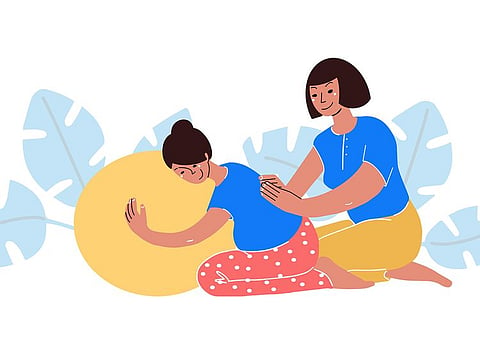Pregnancy in UAE: What is a doula and do you really need one?
The birth professionals can help make labour an empowering event

“I had a really bad experience with my first delivery – it was a C-section,” says Leila Abdo, a 35-year-old Yemeni expat based in Dubai. “So I felt like I needed a doula for a second one – to help me with knowing what choices I had, to help me make decisions at the hospital – and it was such a different experience; it was a really positive, lovely birth the second time around. And it was a natural delivery!”
But what exactly is a doula?
The term’s origins lie in Greek; it means ‘a woman who serves’, explains Delphine Dumur, a French national and doula based in Dubai who runs the instagram handle @letsbirthtogether. “We are really at the service of the mother. We offer her continuous support from A to Z, until the baby is born and after birth, we will be there if she chooses to breastfeed,” she says.
US-based doula-certifying organisation Dona International explains that a doula is, “…a trained professional who provides continuous physical, emotional and informational support to a mother before, during and shortly after childbirth to help her achieve the healthiest, most satisfying experience possible.”
We guide expectant couples to the right resources, evidence-based information.

“We know a lot about childbirth, but we are more trained in supporting a couple during pregnancy, labour at birth and early post-partum. What I mean by support is emotional support, physical support – because we learn a lot about labour positions – and we also learn a lot about those early days as a new parent. So there’s also a lot of informational support. We guide expectant couples to the right resources, evidence-based information. We also like to stress on the fact that we are not medical professionals,” says Belly Baby Mom’s founder Shereen Zarroug, whose own third pregnancy was a catalyst for career change. (After her positive birthing experience with a doula, she quit her nine-to-five job to start the UAE’s first doula company.)
When should you consider approaching a doula?
Dumur says right from the get-go, as this gives both doula and parents-to-be a chance to familiarise themselves with one another.
“I will always recommend women reach out to different doulas and find the one she gels with most. It’s such an important moment that I’ll be very honoured to be a part of, but the mums need to be comfortable with me. So it’s very important that they reach out at the beginning of the pregnancy. But it’s not too late if you are 25 weeks pregnant. It gives you enough time to get to know each other.
I will always recommend women reach out to different doulas and find the one she gels with most. It’s such an important moment that I’ll be very honoured to be a part of, but the mums need to be comfortable with me. So it’s very important that they reach out at the beginning of the pregnancy.

“Sometimes, they need to discuss their fears, whatever they are feeling anxious about. This takes time – think of it like prenatal therapy – they need to speak out and to express everything so we are on the same page. That way, when the baby comes there’s no surprise.”
She also talks of code words that can be set up – one word that would mean the birth plan needs to change on the big day.
Zarroug adds: “Most women start to look into doula support around their 20th week mark or just around that. I think that’s a good time – most of my clients I start working with from 20 weeks onwards. One of the main things is because we’ve got past that first trimester where you are feeling nauseous, now you are more relaxed. But it is also good mid-pregnancy, because as a package, we offer two-three sessions where you actually sit with the mum and go through her birth preferences and just getting to know each other.”
Does the doula write the birth plan?
Well, yes and no. “The doula can help the family write the birth plan,” says Dumur. “So we’ll go through the labour stages, what can happen, medical process that can happen at a hospital, because she has to visualise,” she says, adding that by talking about the benefits, risks and choices a woman has during labour, together they can work out plan a, b and c.
“So I have different slides I can show her, I also have a doll through which I can show her the process of giving birth, all the different stages: Sometimes, they have no clue [what to expect] so we need to start from scratch,” she says.
Did you know there are different birthing positions?
Doula Delphine Dumur explains, there’s the standing or squatting position. “Ideally it’s the standing position – you want the gravity and the head of the baby will come very easily if you are standing or kneeling on the floor.” Shereen Zarroug adds: “It makes labour shorter and it’s just more comfortable as well. We are not there to tell her, ‘You must give birth in a certain position,’ but if you leave a woman to her own she will probably get into a different position rather than on her back.” There are various squatting positons that she can try. “The floor-supportive squat opens up the pelvis 30 per cent more than other positions.” “What’s interesting is that we believe that if a woman has an epidural she must be on the bed, flat on the back … doulas can help women get into different positions even if she is taking an epidural. So an all-four position on the bed is possible,” she says.
Support during birth
“A doula can be very supportive during birth – she can tell her about the different positions and give her comfort measures such as [a back massage] with different tools or even with fists – we call it the hip squeeze. I could physically support her, hold her if the partner isn’t there or along with the partner,” says Dumur.
Where is the husband in all this?
The husband and doula generally tag-team if either needs a short break, but they both are on hand to ensure the mum’s choices are adhered to and that she gets constant support. “The husband may have limited knowledge about birth, the procedures, or whatever goes in the hospital, but the doula has the knowledge and the experience and they can use it both for support and to help the partner,” says Dumur.
Does a doula counsel the husband as well?
Yes, she does. First meetings ahead of the birth call are important. They allow the awkwardness to abate and conversations to begin. Doula Shereen Zarroug adds: “If they have any questions we can answer them; a lot of the time they don’t know what their role is.”
What are the biggest misconceptions people have about doulas?
Zarroug lists the preconceived notions that she encounters:
1. A doula is the same as a midwife.
“There are similarities – we both care for the woman, we are there to support and care for the woman and her husband, but there are some differences such as, we are not medical professionals,” she says. “We offer continuous labour support – midwives work in shifts. A doula starts to work with you during pregnancy, so you get to know her, and having a person who knows your preferences and plans is comforting.”
2. We offer medical advice.
“It can be misconstrued as medical advice, especially by professionals, but what we do is guide parents-to-be to resources to look into and make those decisions for themselves. But we would never advise them medically,” she says.
3. Well, if my husband or mum are there, why do I need a doula?
“It’s great and you are always encouraged to have your husband or your mum there. But – not to be biased – I do think it’s better to have a doula who is a birth professional and has the knowledge and the current information about birth on hand.
“Plus, we come with a doula bag, which comes with massage tools, aroma therapy oils, diffusers, LED lights… we really work the space to make it look very comfortable and relaxing for the mums as well,” she laughs.
Want to engage a doula? This is what you should expect
Have a question about parenthood or a point of view you'd like to express? Write to us at parenting@gulfnews.com
Sign up for the Daily Briefing
Get the latest news and updates straight to your inbox



